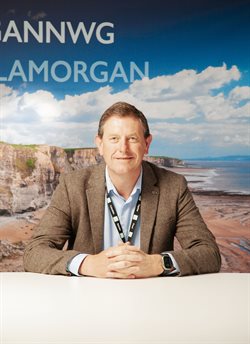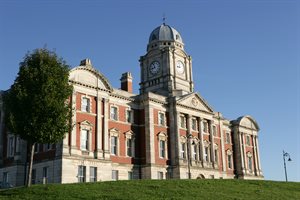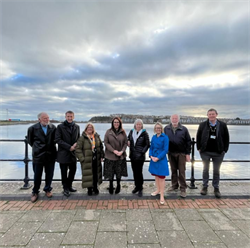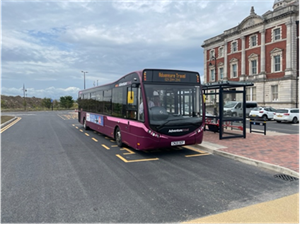Staffnet+ >
The Role of Economic Resilience in the Reshaping Programme and Corporate Plan

The Role of Economic Resilience in the Reshaping Programme and Corporate Plan
09 August 2024
Boosting economic resilience is another important aspect of the new Corporate Plan, which sets out a vision of how the Council will operate by 2030 and beyond.
It is strongly linked to job creation and the ability to offer a variety of well-paid employment opportunities within the Vale.
A cornerstone of the Corporate Plan is the Reshaping Programme as that explains the changes that must be made to realise the Council’s ambitions.
Reshaping is about reinventing and re-examining services across five key areas: Target Operating Model, Service Transformation, Strengthening Communities, Digital Innovation, and Economic Resilience.
Over recent weeks, different member of the Council’s Strategic Leadership Team have contributed to articles about a topic that closely relates to work going on in their Directorate.
 As Director of Place, Marcus Goldsworthy is at the forefront of efforts to make the Vale more economically resilient.
As Director of Place, Marcus Goldsworthy is at the forefront of efforts to make the Vale more economically resilient.
“Economic resilience means an economy that can handle surprises and bounce back from tough times,” said Marcus.
“It involves having a mix of industries and business, solid infrastructure, and financial stability, along with strong community support.
“That means businesses and people can quickly recover and keep moving forward even though there may be bumps in the road along the way.
“Our goal is to create an environment where businesses and individuals in the Vale can thrive. This involves securing external funding, collaborating across service areas, and partnering with local and regional stakeholders. Together, we can support businesses, drive regeneration, and excel in placemaking.”
Placemaking is about creating good quality areas to live and is concerned with the environment, the individuals that inhabit these spaces and the quality of life that comes from the interaction of people and their surroundings.
It is central to successful regeneration in the Vale, fostering community engagement, enhancing local identity, and driving economic growth.
With the Council’s recent endorsement of the Placemaking Charter for Wales, every department now plays a role in this process.
By revitalising underused areas into vibrant, inclusive spaces, placemaking promotes social cohesion and attracts investment.
 Well-designed spaces, transport links, and housing support sustainable development, environmental responsibility, and reduced carbon footprints, ultimately creating resilient and attractive communities.
Well-designed spaces, transport links, and housing support sustainable development, environmental responsibility, and reduced carbon footprints, ultimately creating resilient and attractive communities.
Upcoming projects include transforming Barry’s Dock Offices into over 25,000 square feet of commercial space to help new businesses grow and the £35 million Barry Making Waves Project.
That will develop a marina, park, and new watersports centre. The Council is also backing a £20 million long-term community-led investment for Barry through the UK Government’s Long-Term Plan for Towns, focusing on safety, town centre regeneration, and transport connectivity.

"The Vale has historically experienced high levels of out-commuting, affecting our economy and environment,” said Marcus.
“By creating local job opportunities, we can reduce emissions and support our Project Zero commitment to become carbon neutral by 2030.
“Economic development initiatives are essential for alleviating poverty by fostering a supportive environment for business success and job creation.”
As well as looking for funding opportunities, working with partner organisations is another important part of creating Economic Resilience.
That means collaboration with Welsh and UK Governments, local business and industry as well as third sector organisations like charities, social enterprises and community groups.
The Council’s involvement with the Cardiff Capital Region, made up of the Blaenau Gwent, Bridgend, Caerphilly, Cardiff, Merthyr Tydfil, Monmouthshire, Newport, Rhondda Cynon Taff, Torfaen and Vale Local Authority areas is also important.
 “The Vale’s geographical position within the Cardiff Capital Region enhances its economic potential. This partnership has already created over 3,000 jobs and supported more than 200 businesses,” said Marcus.
“The Vale’s geographical position within the Cardiff Capital Region enhances its economic potential. This partnership has already created over 3,000 jobs and supported more than 200 businesses,” said Marcus.
“Recent developments include the acquisition of Aberthaw Power Station and significant investments in the Metro transport system.
“The Council plays a key role in identifying investment sites, providing business support, and offering grants to stimulate local growth.”
Welsh Government’s recent announcement of a further £205 million investment in Cardiff Airport will also act as a catalyst for growth and further support the wider Bro Tathan Enterprise Zone.
Located in St Athan, Bro Tathan is Welsh Government owned business park, which has the potential to generate significant growth.
The Council’s new Investment Strategy and governance structure aim to accelerate project delivery and attract further investment.
“Even amidst financial challenges, there are numerous opportunities for innovative projects that can significantly strengthen the Vale’s economic resilience,” added Marcus.
“Collaborative efforts with Welsh and UK Governments, local businesses, and third-sector organisations are crucial for achieving these goals.
“We are committed to securing the best economic future for our residents through strategic cooperation and investment.”
Rob Thomas, Tom Bowring and Lloyd Fisher recently delivered a session on the Council’s Five Wellbeing Objectives and how they link to the Reshaping Programme and Corporate Plan, which is available to view online.
Over the coming months, staff will have further opportunities to share their thoughts and get involved in the process as this work develops.
